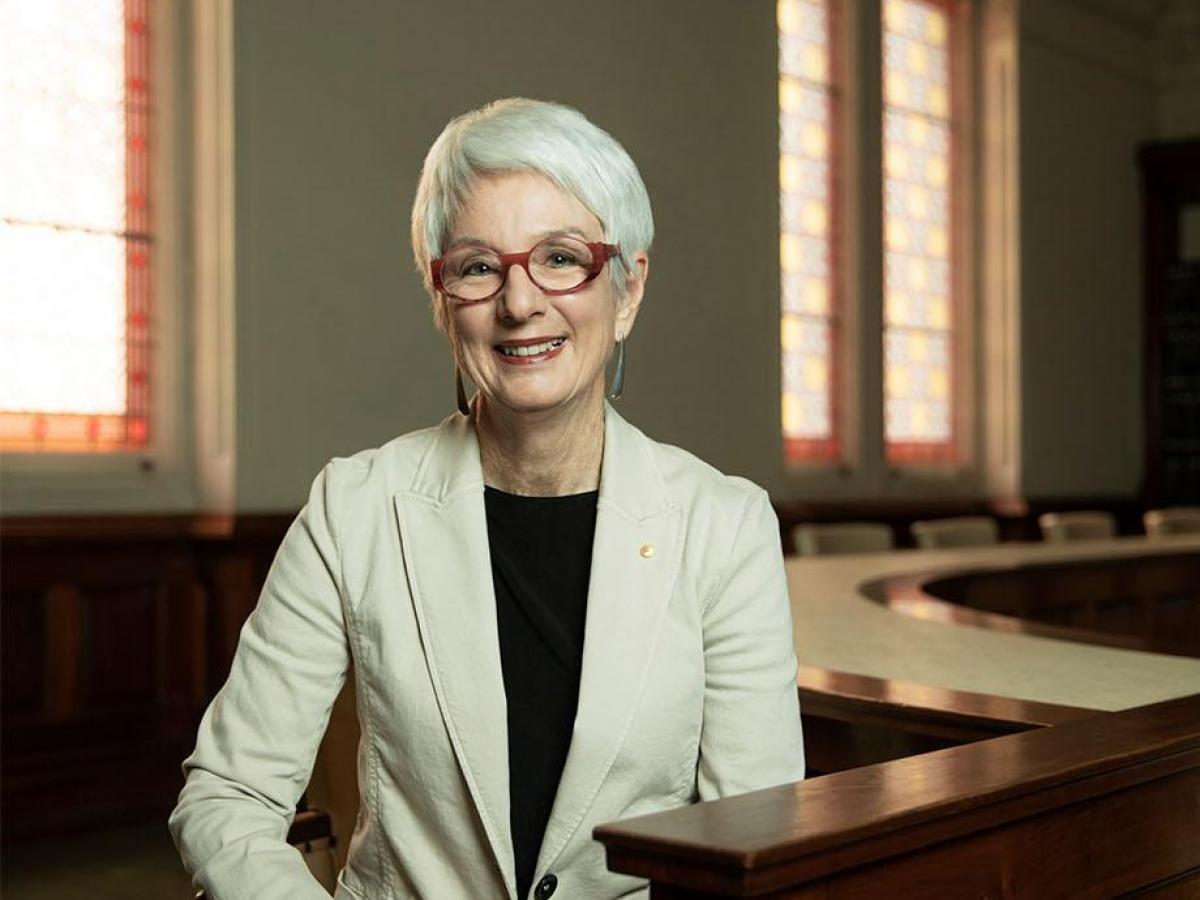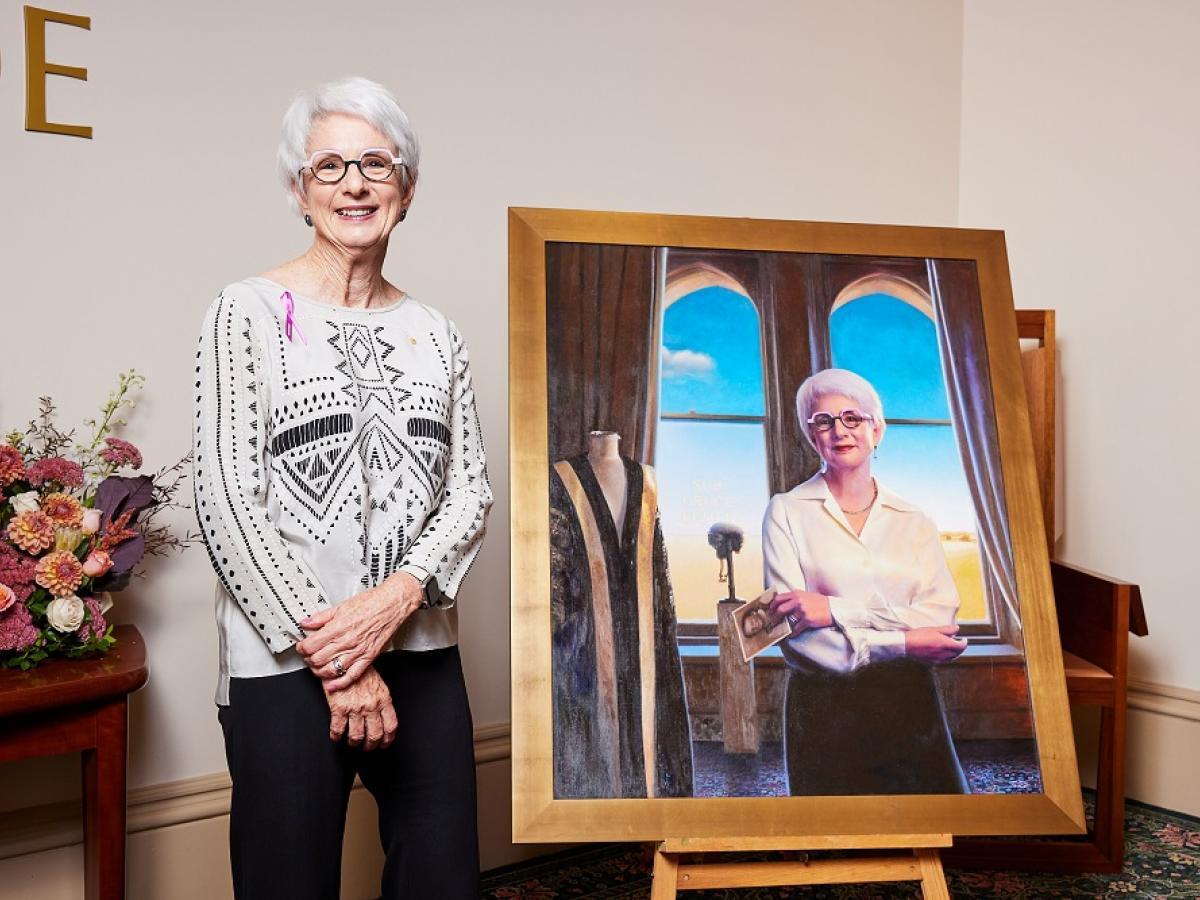Celebrating our colleagues: the Hon. Catherine Branson AC SC

Leading universities with poise and persistence
Contrasting the gravity of her title and formidable career achievements, the Hon. Catherine Branson AC SC, knows how to connect at a very human level. She is pleasant and disarming. She’s impeccably dressed yet not showy, polite without being condescending (“Would you like tea?”), and generous with time even though it’s clear that her day follows a full schedule.
Cathy is the University of Adelaide’s 17th Chancellor, a position she assumed in the aftermath of a critical leadership failure, both at the senior management and governance level.
“I was aware that my first role as Chancellor was to address a crisis promptly and take measures to ensure, so far as possible, that nothing similar could happen again,” she says. “This was achieved by seeing that every member of the University Council and all members of the senior management understood clearly that they were respected and their views mattered - and that it was essential the two teams worked cooperatively together in the best interest of the University.”
This no-nonsense approach, which incorporates collegial respect and clear leadership, characterises Cathy, who was raised on a farm near Hallett in the mid-north of South Australia. “I grew up in a country family,” she says. “I think my parents welcomed the birth of a daughter (they already had a son and would later have another) but it soon became clear that some life choices available to my brothers would not be open to me. From my very early days it was made plain that, when I reached a certain age, I could no longer expect to make my home on that property”.
While being thought of as ‘second-class’ had its downsides, it developed qualities of independence and resilience that were vital for the young Cathy’s future careers. As she matured, it underpinned her growing commitment to human rights and equal opportunity.
“I was disabused fairly early of the idea that simply being male gave you special capacities that females don’t have because my experience showed that wasn’t so. Most women I know who have brothers would probably think the same.”
After boarding at an all-girls school in Adelaide, Cathy graduated from the University of Adelaide in both Law (1970) and Arts (1977), and went on to have a distinguished career.
At 35, she became Crown Solicitor of South Australia – and Chief Executive Officer of the Attorney-General's Department – the first female Crown Solicitor in Australia and first woman to become permanent head of a Government department in South Australia. She served for more than 14 years as a judge of the Federal Court of Australia. And, as President of the Australian Human Rights Commission for four years, was a determined advocate for the disadvantaged.

“I believe what helped me overcome discrimination early in my career was that I was in a profession with recognised qualifications for entry, and pretty good objective measures for success,” she says. “It was probably my pride that pushed me to do what I could to perform as well if not better than anyone else. At a time when female barristers were rare, I enjoyed the benefit of being noticed and I found that client reluctance to be represented by a woman soon dissipated. My capacity to speak up with confidence got stronger as I developed greater professional competence and recognition. I also enjoyed the professional, if not the personal advantage, during my mid-career years of having neither a husband nor children so I could devote as much time to my work as I wanted.”
Now into her third term as Chancellor, Cathy is committed to creating a legacy of a well-functioning university that will attract the best students and the best talent from around the world because it’s recognised as a place that values diversity; where women as well as men, people of colour, people who are gender diverse, with different abilities, of different faiths, are all welcomed and encouraged to perform at their very best and for the betterment of our broader society. For some it might seem a tall order, but not for Cathy, who uses the lessons of the past to help inform the future.
“I see feminism as the most significant social revolution of the last millennia and, interestingly, it’s been achieved largely without violence. University campuses powerfully illustrate the impact of this revolution over the past 150 years or so,” she says. “Campuses were once populated overwhelmingly by men; now, we are educating a higher proportion of women than men. The educational experience we offer our female students must allow them not only to envisage a future that is no less fulfilling than their male colleagues, but to actualise that in their lives.”
Cathy is committed to the educational value of enhanced female representation in leadership roles, arguing that it, in turn, enables and encourages young women to understand that leadership is within their grasp, and not the preserve of men. She sees this as not only equitable, but also as avoiding the waste of talent.
“Women will not have an equal educational experience while they can see leadership positions disproportionately filled by men,” she says. “In my view, one of the greatest impediments to the appointment of women to senior leadership roles is the tendency to confuse confidence with competence. No doubt this tendency is reinforced by the internalised image that so many of us carry of what a successful leader looks like; that is, a suit wearing, ‘heroic’ and charismatic man.”
“Women will not have an equal educational experience while they can see leadership positions disproportionately filled by men,” she says. “In my view, one of the greatest impediments to the appointment of women to senior leadership roles is the tendency to confuse confidence with competence. No doubt this tendency is reinforced by the internalised image that so many of us carry of what a successful leader looks like; that is, a suit wearing, ‘heroic’ and charismatic man.”
Cathy’s vision for the future of the University of Adelaide in particular, and universities in general is clear: that campuses should be safe and supportive for all who spend time on them; that the talents and ambitions of women and men should be equally recognised and nurtured; female leaders are visible and effective; and appropriate measures are in place to address the social inequalities that continue to impact the ability of girls and women to provide the leadership of which they are capable.
Read more: Chancellor's leadership acknowledged
Story by Dr Simon Behenna, Internal Communications Coordinator
Recognise a colleague
Show your appreciation for colleagues who consistently demonstrate University Values by supporting, celebrating, motivating, and collaborating with the people around them by completing an online recognition form.
Is there someone you work with who you think the Staff News team could interview for one of these articles? Please send your suggestions here.
